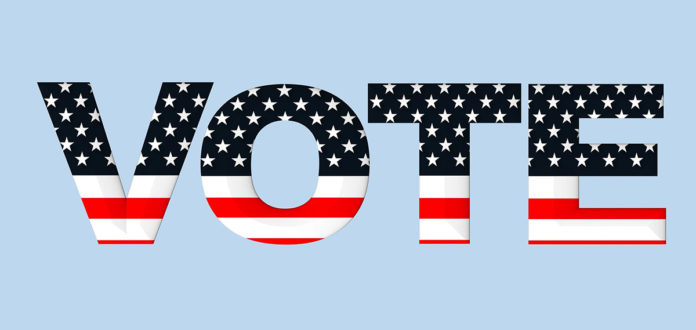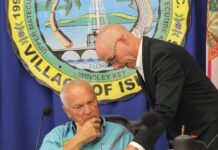Most people know only legal residents of Florida can vote here. And many people assume the same rules used to establish residency in Florida for tax purposes also determine voter eligibility.
But that’s not the case. Did you know, according to the Florida Division of Elections, “legal residency is not defined by law?”
In its 2018 Voter Residency Guide, the Florida Division of Elections goes on to state, “However, over the years, the courts and the Florida Department of State/Division of Elections have construed legal residency to be where a person mentally intends to make his or her permanent residence for purposes of voter registration.”
Yes, you read that correctly. “State law (in Florida) does not specify a length of time for which you must have been a resident to be eligible to vote,” states the nonprofit website Ballotpedia.
Florida does require people to live here for more than six months (commonly referred to as the 183-day rule) in order to claim the Sunshine State as their primary residence for purposes of avoiding state income tax elsewhere or claiming a homestead exemption on a Florida residence. Such residency requirements are investigated and enforced by county property appraisers throughout Florida.
But for purposes of voting in Florida, the residency requirements are much less stringent, and often are based largely on the honor system. The supervisor of elections in each Florida county typically must believe people when they say, for example, that they live in Key West or in Monroe County.
“We do have a lot of very fortunate people in Monroe County, and elsewhere in Florida, who have two, three or four homes,” Monroe County Supervisor of Elections Joyce Griffin told the Keys Weekly on Sept. 21. “Those people have to pick where they will vote and where their place of residence is. I usually advise those people to contact their lawyer, because chances are, the attorney has designated one of their homes as a primary residence for tax purposes.”
Griffin added, “We also have people who are only here a week of the year, but they vote here. But I have no legal powers. I know there is ugly in the world and I know there are liars. But some people simply don’t know the law.”
A 2016 article in the Sun Sentinel states that perhaps too much of Florida’s voter registration process is based on the honor system.
Griffin said she doesn’t think the issue is a widespread problem in Monroe County, and she said she and her staff work hard to ensure the integrity of all elections. She encourages anyone who suspects voter fraud to contact her office — they can remain anonymous — with a name for her to research.
Griffin added that the national Electronic Registration Information Center, known as ERIC, will help identify voter fraud or double voting, which occurs when people vote in two different states.
Florida Gov. Ron DeSantis said in August 2019 that Florida would join ERIC, which is a voluntary program meant to ensure election integrity. But Florida had not completed its registration with ERIC prior to the November 2020 general election, according to a September 2020 story by WPTV in West Palm Beach. Florida is now a member of ERIC, according to the ERIC website.
Former Key West city commissioner Margaret Romero also is hopeful that ERIC will help identify voters who don’t live where they vote.
Romero recently sent a letter to the governor, the attorney general, Florida Keys State Rep. Jim Mooney and Sen. Ana Maria Rodriguez.
In the letter, Romero points out the lack of clarity in Florida’s voter residency laws and urges the state lawmakers to “require that each Florida voter is a legal Florida resident and does not vote in any other state or county.”
“There is no definition of what constitutes a legal resident of Florida as pertains to voting in Florida,” Romero writes. “The voter registration application form indicates that you must be a Florida resident, along with being a U.S. citizen and at least 18 years old. Nothing stipulates the requirements of residency. Nothing says you cannot be registered to vote in more than one county or state.
“The form requires Florida driver’s license number or Florida identification card number, or the last four digits of the social security number. These are only for identification purposes and not for proof of Florida residency. Also of note: If the applicant is 65 or older, they need not show a photo ID.”
This lack of clarity, Romero writes, “provides an excuse for supervisors of election to say things like ‘I just have to believe what they say’ when a perceived voting violation is brought to their attention. … The absence of definition 1.) creates an environment where deception and misrepresentation go unchecked, 2.) facilitates voter fraud/cheating, and 3.) diminishes the integrity and value of valid voters who actually live in the precinct, county or state.”
“How does one prosecute or rectify the situation if there is no definition or set standards of what rules are being broken?” she asks in her letter, but she has not received a response.
Election watchers in other Florida counties have shared similar concerns for several years.
A January 2016 article in the Sun Sentinel, states, “All this talk of voter fraud all these years and it turns out Florida election officials might have been looking in the wrong place. The problem isn’t just felons or non-citizens improperly casting ballots; it’s also well-off snowbirds with homes in two states who are registered — and voting — in both states.
“At least that’s what a local data analyst has discovered, as he found dozens of Broward and Palm Beach County voters (and about 50 statewide) also cast ballots in New York, New Jersey and North Carolina in the 2014 general election.
“‘This shows there can be just as much fraud with people who are better off,’ said Andrew Ladanowski, an information technology consultant from Coral Springs.
“Broward Supervisor of Elections Brenda Snipes said being registered in two states is not a crime, and that the voting law needs clarification.
“‘I think it should be one person, one vote, but I think our statute should be clearer on that,’ Snipes said. ‘The way it’s written now, I think the whole thing is a legal loophole.’”



























